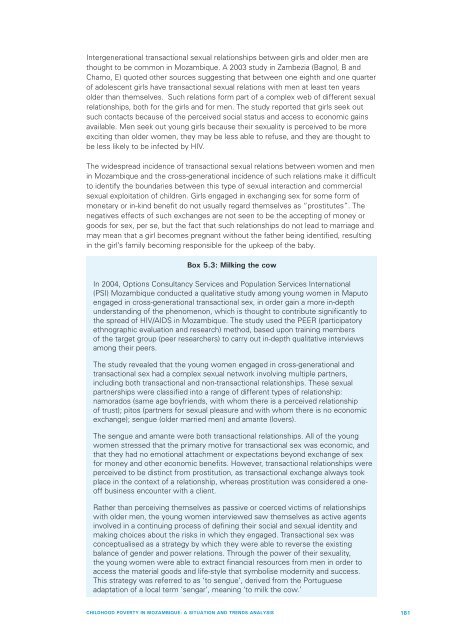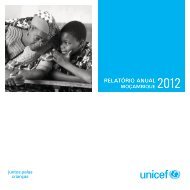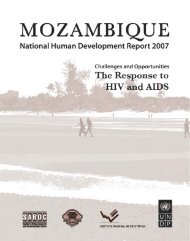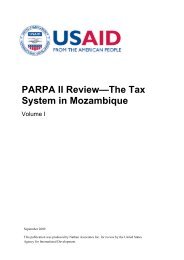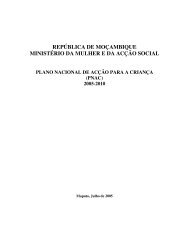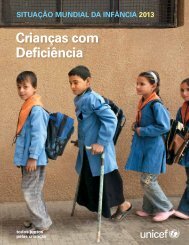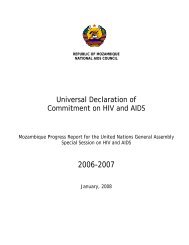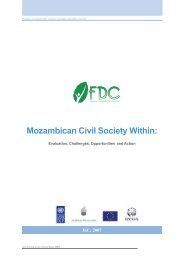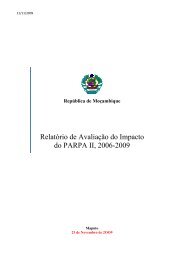Child Poverty in Mozambique. A Situation and Trend ... - Unicef
Child Poverty in Mozambique. A Situation and Trend ... - Unicef
Child Poverty in Mozambique. A Situation and Trend ... - Unicef
You also want an ePaper? Increase the reach of your titles
YUMPU automatically turns print PDFs into web optimized ePapers that Google loves.
Intergenerational transactional sexual relationships between girls <strong>and</strong> older men are<br />
thought to be common <strong>in</strong> <strong>Mozambique</strong>. A 2003 study <strong>in</strong> Zambezia (Bagnol, B <strong>and</strong><br />
Chamo, E) quoted other sources suggest<strong>in</strong>g that between one eighth <strong>and</strong> one quarter<br />
of adolescent girls have transactional sexual relations with men at least ten years<br />
older than themselves. Such relations form part of a complex web of different sexual<br />
relationships, both for the girls <strong>and</strong> for men. The study reported that girls seek out<br />
such contacts because of the perceived social status <strong>and</strong> access to economic ga<strong>in</strong>s<br />
available. Men seek out young girls because their sexuality is perceived to be more<br />
excit<strong>in</strong>g than older women, they may be less able to refuse, <strong>and</strong> they are thought to<br />
be less likely to be <strong>in</strong>fected by HIV.<br />
The widespread <strong>in</strong>cidence of transactional sexual relations between women <strong>and</strong> men<br />
<strong>in</strong> <strong>Mozambique</strong> <strong>and</strong> the cross-generational <strong>in</strong>cidence of such relations make it difficult<br />
to identify the boundaries between this type of sexual <strong>in</strong>teraction <strong>and</strong> commercial<br />
sexual exploitation of children. Girls engaged <strong>in</strong> exchang<strong>in</strong>g sex for some form of<br />
monetary or <strong>in</strong>-k<strong>in</strong>d benefit do not usually regard themselves as “prostitutes”. The<br />
negatives effects of such exchanges are not seen to be the accept<strong>in</strong>g of money or<br />
goods for sex, per se, but the fact that such relationships do not lead to marriage <strong>and</strong><br />
may mean that a girl becomes pregnant without the father be<strong>in</strong>g identified, result<strong>in</strong>g<br />
<strong>in</strong> the girl’s family becom<strong>in</strong>g responsible for the upkeep of the baby.<br />
Box 5.3: Milk<strong>in</strong>g the cow<br />
In 2004, Options Consultancy Services <strong>and</strong> Population Services International<br />
(PSI) <strong>Mozambique</strong> conducted a qualitative study among young women <strong>in</strong> Maputo<br />
engaged <strong>in</strong> cross-generational transactional sex, <strong>in</strong> order ga<strong>in</strong> a more <strong>in</strong>-depth<br />
underst<strong>and</strong><strong>in</strong>g of the phenomenon, which is thought to contribute significantly to<br />
the spread of HIV/AIDS <strong>in</strong> <strong>Mozambique</strong>. The study used the PEER (participatory<br />
ethnographic evaluation <strong>and</strong> research) method, based upon tra<strong>in</strong><strong>in</strong>g members<br />
of the target group (peer researchers) to carry out <strong>in</strong>-depth qualitative <strong>in</strong>terviews<br />
among their peers.<br />
The study revealed that the young women engaged <strong>in</strong> cross-generational <strong>and</strong><br />
transactional sex had a complex sexual network <strong>in</strong>volv<strong>in</strong>g multiple partners,<br />
<strong>in</strong>clud<strong>in</strong>g both transactional <strong>and</strong> non-transactional relationships. These sexual<br />
partnerships were classified <strong>in</strong>to a range of different types of relationship:<br />
namorados (same age boyfriends, with whom there is a perceived relationship<br />
of trust); pitos (partners for sexual pleasure <strong>and</strong> with whom there is no economic<br />
exchange); sengue (older married men) <strong>and</strong> amante (lovers).<br />
The sengue <strong>and</strong> amante were both transactional relationships. All of the young<br />
women stressed that the primary motive for transactional sex was economic, <strong>and</strong><br />
that they had no emotional attachment or expectations beyond exchange of sex<br />
for money <strong>and</strong> other economic benefits. However, transactional relationships were<br />
perceived to be dist<strong>in</strong>ct from prostitution, as transactional exchange always took<br />
place <strong>in</strong> the context of a relationship, whereas prostitution was considered a oneoff<br />
bus<strong>in</strong>ess encounter with a client.<br />
Rather than perceiv<strong>in</strong>g themselves as passive or coerced victims of relationships<br />
with older men, the young women <strong>in</strong>terviewed saw themselves as active agents<br />
<strong>in</strong>volved <strong>in</strong> a cont<strong>in</strong>u<strong>in</strong>g process of def<strong>in</strong><strong>in</strong>g their social <strong>and</strong> sexual identity <strong>and</strong><br />
mak<strong>in</strong>g choices about the risks <strong>in</strong> which they engaged. Transactional sex was<br />
conceptualised as a strategy by which they were able to reverse the exist<strong>in</strong>g<br />
balance of gender <strong>and</strong> power relations. Through the power of their sexuality,<br />
the young women were able to extract f<strong>in</strong>ancial resources from men <strong>in</strong> order to<br />
access the material goods <strong>and</strong> life-style that symbolise modernity <strong>and</strong> success.<br />
This strategy was referred to as ‘to sengue’, derived from the Portuguese<br />
adaptation of a local term ‘sengar’, mean<strong>in</strong>g ‘to milk the cow.’<br />
CHILDHOOD POVERTY IN MOZAMBIQUE: A SITUATION AND TRENDS ANALYSIS<br />
181


